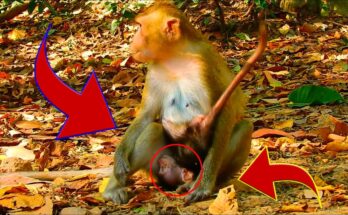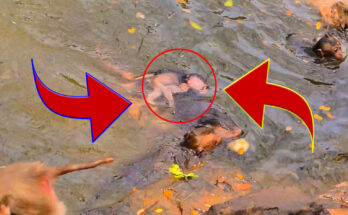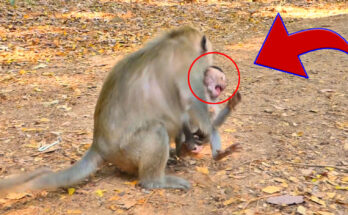In the dense, green canopy of the jungle, a tiny, newborn monkey opened its eyes for the first time. The world around it was vast, filled with the sound of rustling leaves, distant calls of other animals, and the chirping of birds. It was a world full of wonder, but to the newborn, it felt cold and unfamiliar. Born into a tight-knit family of monkeys, this little one had only moments ago left the safety of its mother’s womb, and yet, it was already facing an overwhelming struggle.
The baby monkey, with soft fur and tiny limbs, instinctively reached out for warmth. Its small hands grasped feebly at the air, hoping to find something, anything to hold onto. The newborn’s eyes searched desperately for its mother, but to its shock and confusion, the one being it needed most was nowhere to be found. It was cold, shivering, and afraid, instinctively drawn to its mother’s warmth. But there was a barrier it couldn’t understand—its mother, the one who should have been there to care for it, refused to even look in its direction.
In the jungle, such moments are rare, but not unheard of. For a newborn monkey, the bond with its mother is crucial for survival. A mother monkey’s warmth, nurturing, and protection are the first steps in giving her child a fighting chance in the unforgiving world of the wild. But sometimes, things go wrong, and the bond that should have been formed naturally is disrupted. Whether due to stress, fear, or confusion, the mother refused to comfort her newborn, leaving it to struggle on its own.
The poor baby, weak from the ordeal of birth, cried out in small, desperate sounds. Its tiny body trembled, and it reached out with trembling arms, trying to crawl toward its mother. But every time it got close, the mother would turn away, offering no comfort, no warmth, no reassurance. The baby monkey’s heart pounded in its chest, and a sense of panic began to set in. Without the warmth of its mother’s body, the little one was vulnerable to the cold of the jungle air, and it lacked the strength to survive on its own.
The newborn’s cries echoed through the trees, but the other monkeys in the group paid no attention. They were busy with their own activities, gathering food, playing, or swinging from tree to tree. The jungle, vast and full of life, seemed indifferent to the plight of the baby monkey. But to the newborn, it was an isolating world, one where survival was a constant battle. The mother, though physically close, was emotionally distant, and the baby could not understand why it was being rejected.
Desperately, the newborn clung to the tree, trying to steady itself with trembling hands. It was hard for it to hold on, its tiny limbs too weak to grip the bark with the strength it needed. The baby monkey continued to make futile attempts to reach its mother, but each time, it failed. The exhaustion of birth had drained its energy, and the lack of warmth made its little body weaker with each passing minute.
At some point, the baby fell, its small body tumbling to the jungle floor below. It landed softly on the leaves, but the fall was another blow to its fragile body. Bruised and confused, it lay there for a moment, trying to gather its bearings. The sounds of the jungle surrounded it—distant bird calls, the rustling of the wind in the trees—but nothing felt comforting. Everything was strange, foreign, and cold.
The helpless baby monkey, struggling to hold on, could only look up at its mother, who still refused to approach. It was a heartbreaking sight—a mother who should have been there to guide, protect, and nurture was emotionally absent, leaving her baby to face the harsh reality of the wild alone.
Luckily, the jungle is not without its compassion, even in the most unlikely of places. A fellow monkey, noticing the distressed newborn, approached it cautiously. This older monkey, perhaps a cousin or an aunt, reached out to the little one, offering warmth and comfort. It was a small gesture, but it was enough to help the baby monkey survive, if only for a moment.
Slowly, the newborn felt the warmth it had so desperately needed. Its trembling subsided as the older monkey held it close, providing the safety and security that the mother could not. Though it was not the bond the baby had hoped for, it was the first step toward survival. With the warmth and love of a surrogate family member, the newborn monkey was able to rest and regain strength.
Though the situation was heart-wrenching, it was also a reminder of the unpredictable nature of the wild. Some mothers might not have the ability, emotional capacity, or understanding to care for their newborns. In such cases, the community often steps in, ensuring that the cycle of survival continues.
For the baby monkey, the struggle was far from over. But in that moment, with warmth and care from an unexpected source, it had a glimmer of hope. As the jungle continued to hum with life, the little one held on, clinging to the idea that perhaps, just maybe, tomorrow would be better.


